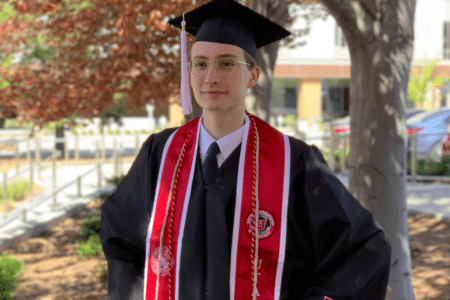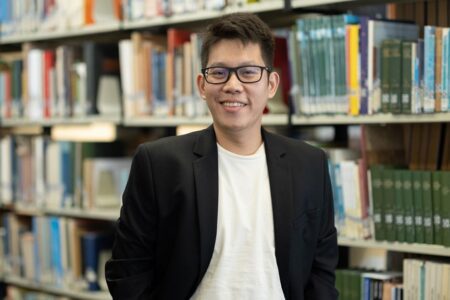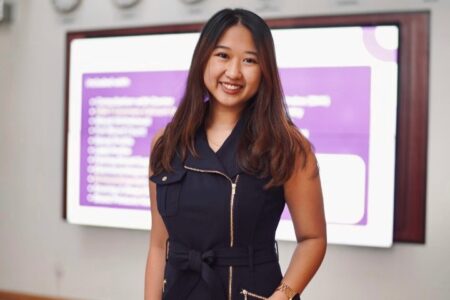
Biomedical researcher and PhD candidate, Justin Ng Tze Chang has big plans — like, save-the-world from age-related illnesses kind — and he’s starting with something small. Very small.
We’re talking about fruit flies.
Yes, those little bugs that seem to appear out of nowhere the moment you forget to put your bananas in the fridge.
Solving age-related illnesses with…fruit flies?
It may sound like something from a Cartoon Network show, but Ng is dead serious.
With the world population ageing faster than ever, he’s exploring how these tiny creatures can unlock the secrets to a longer, healthier life.
In fact, in 2020, for the first time ever, there were more people aged 60 and over than children under five, according to the World Health Organisation. Between 2015 and 2050, the proportion of the world’s population over 60 years will nearly double from 12% to 22%.
That also means we’re staring down a future filled with age-related illnesses — diabetes, dementia, depression, and more.

Ng’s work seeks to unravel the biological mechanisms of ageing, leveraging the Drosophila model to explore how conserved ageing pathways intersect with environmental stressors, metabolic diseases, and circadian biology. Source: Justin Ng
“With how fast the ageing population is growing, there’s going to be a big economic issue on how we address caregiving for the elderly,” Ng shares. “It’s going to have a big strain on healthcare systems worldwide, and we’ve seen how countries have dealt with the COVID-19 pandemic; it wasn’t the best.”
So instead of waiting for people to get sick and spending a fortune trying to treat them, Ng wants to flip it. Why not find a way to help people age without health issues?
And yes, he plans to do it with fruit flies.
The buzz around the bug
Rats, mice, rabbits — all fine choices for research. But fruit flies? They’re effective when it comes to testing theories. TLDR: fruit flies make excellent lab partners.
Still, some might raise an eyebrow. “Really? Fruit flies?” I was one of them.
Ng gets it, but he was quick to point out that these bug-gers are no strangers to the science lab.
“Fruit flies play such a big part in scientific research, and nine scientists share five Nobel Prizes based on their work using the common fruit flies,” says Ng. “Fruit flies are also widely used in genetic and x-ray studies, perfect for biomedical research.”
View this post on Instagram
They’re also way cheaper and faster than other animals. Testing on rats or mice can take years and burn through massive research budgets, without guaranteeing that anything will even work.
Meanwhile, scientists have already done some wild things with fruit flies.
A graduate of Brown University has managed to get the flies addicted to alcohol to understand better how drinkers think; meanwhile, in 2024, researchers at Princeton University mapped up an entire (fly) brain to understand diseases of the human brain.
But is it ethical?
That’s a fair question — and the answer is yes.
“Fruit flies are invertebrates, so they do not have a backbone, and there’s a possibility of them not feeling pain,” Ng explains. “Plus, they have a simple immune system; therefore, if you were to conduct experiments on them, it wouldn’t be as bad as using mice or rats, who can express pain and suffering.”
In other words, it’s more responsible. Fruit flies help researchers confidently test hypotheses before moving on to more complex (and expensive) organisms.

Ng has previously interned at the Royal College of Surgeons in Ireland, Baylor College of Medicine, and the Agency for Science, Technology and Research. Source: Justin Ng
“I was taught that the inevitable fate of birth is to grow old and die of disease”
Ng didn’t always dream of working with fruit flies or decoding the mysteries of ageing. He initially aimed for a psychology degree.
That changed in 2016, when his grandmother was diagnosed with lung cancer. “I dedicated two and a half years to becoming her caregiver,” he says.
Balancing caregiving, a job, and school was not easy, but it lit a spark in him.
In 2017, Ng pursued a BSc in Biomedical Sciences at Queen’s University Belfast.
“I intimately witnessed the personal and financial toll of ageing through my experience as a caregiver for my grandmother, which cost more than the average annual household income, highlighting the stark reality that a comfortable death is a privilege many cannot afford,” he says. “So I wanted to build a career related to health care or something in biology so that I could contribute to the field of healthcare or biomedical research to reduce financial burden,” he says.
After graduation, Ng returned home to Malaysia and worked as a graduate research assistant at the University of Malaya, improving healthcare systems for dengue patients. But one year later, it was time for a new chapter — a master’s degree.
Ng joined Lancaster University’s MSc in Biomedical Science by Research, where he met his unexpected research soulmate — fruit flies — and the need to understand ageing.
“I was working on some ageing research using Drosophila (fruit flies) models, and that’s where my interest grew. I wanted to understand pathways and phases we could modulate to help people live healthier and longer lives,” he shares.

Ng was awarded the President’s Prize by the Institute of Biomedical Science, the Degree Plus Award, First-Year International Student Scholarship, and International Office Undergraduate Scholarship during his time at Lancaster University. Source: Justin Ng
And no, he’s not talking about helping billionaires live forever: “I mean, every day people — how can they live well, without their families worrying about hospital bills or having to take time off to care for them?”
A 2017 Pew Research Centre study found that about 23% US workers have taken leave to care for a seriously ill family member. In the UK, more than 600 people quit work to look after older and disabled relatives every day, according to Carers UK.
“I want a future where your parents, grandparents, or even children are just as healthy as you are, and that you’ll get to spend all the time with them doing the things you love, rather than having them be diagnosed with diseases,” Ng says.
Today, he is a PhD in Cell and Development Biology candidate at Rutgers University in New Jersey, US.
He’s not rushing back to Malaysia just yet — but he has plans. Big ones.
Ng dreams of returning to host STEM outreach programmes in local high schools and universities. He wants to inspire the next generation of researchers and perhaps convince a few of them that fruit flies are cooler than they appear.
Eventually, he hopes to open his own lab. And maybe, just maybe, start a sister branch back home in Malaysia.










